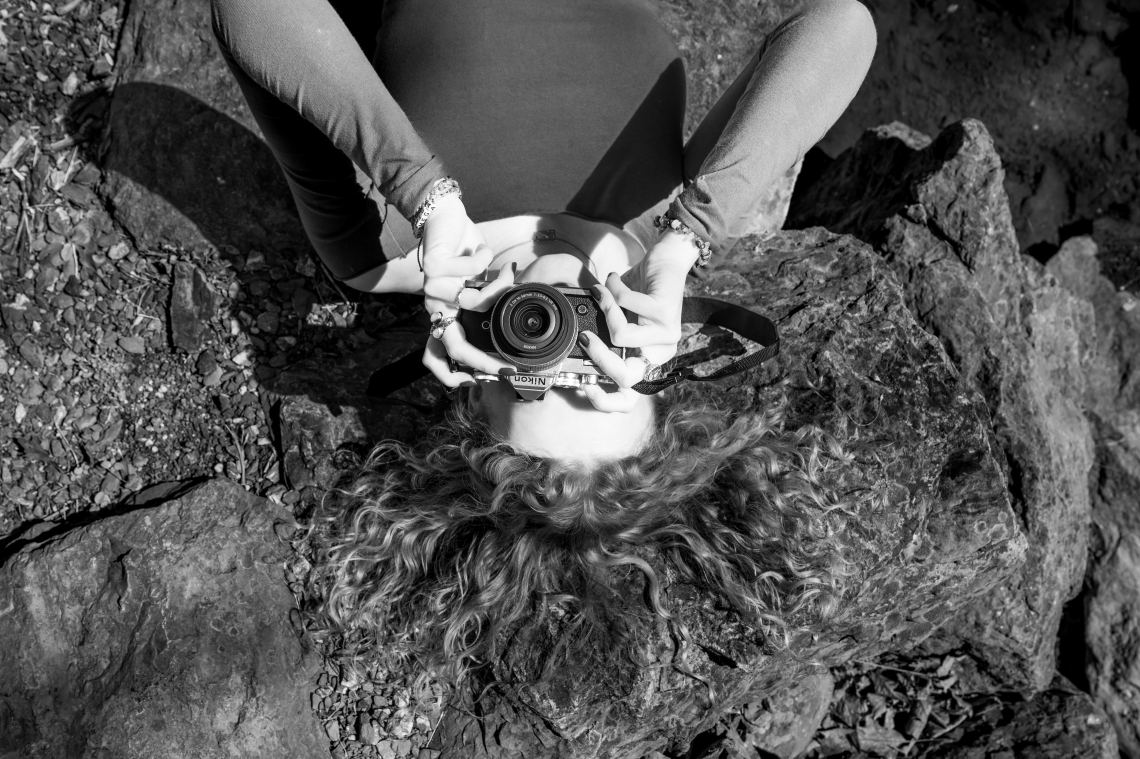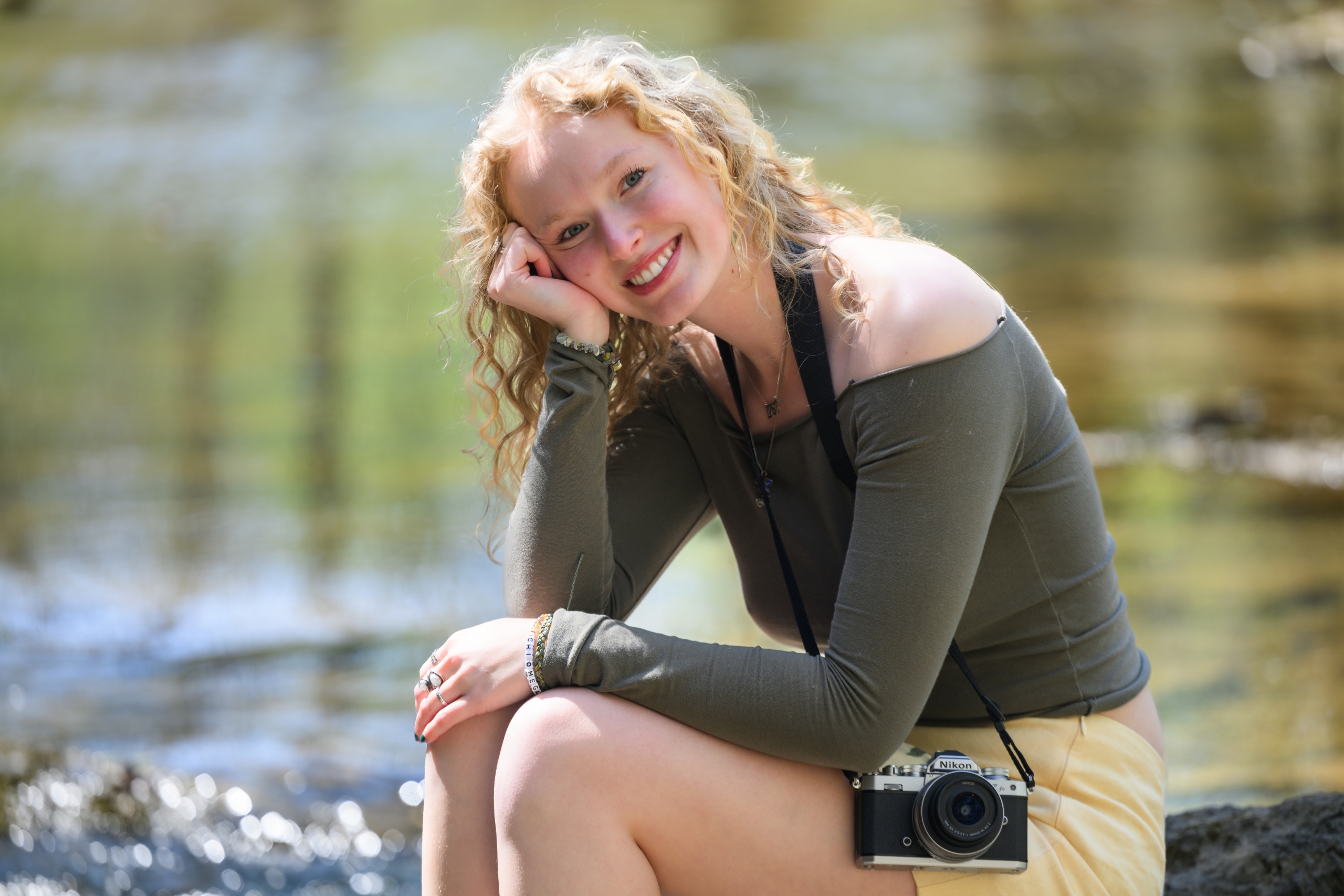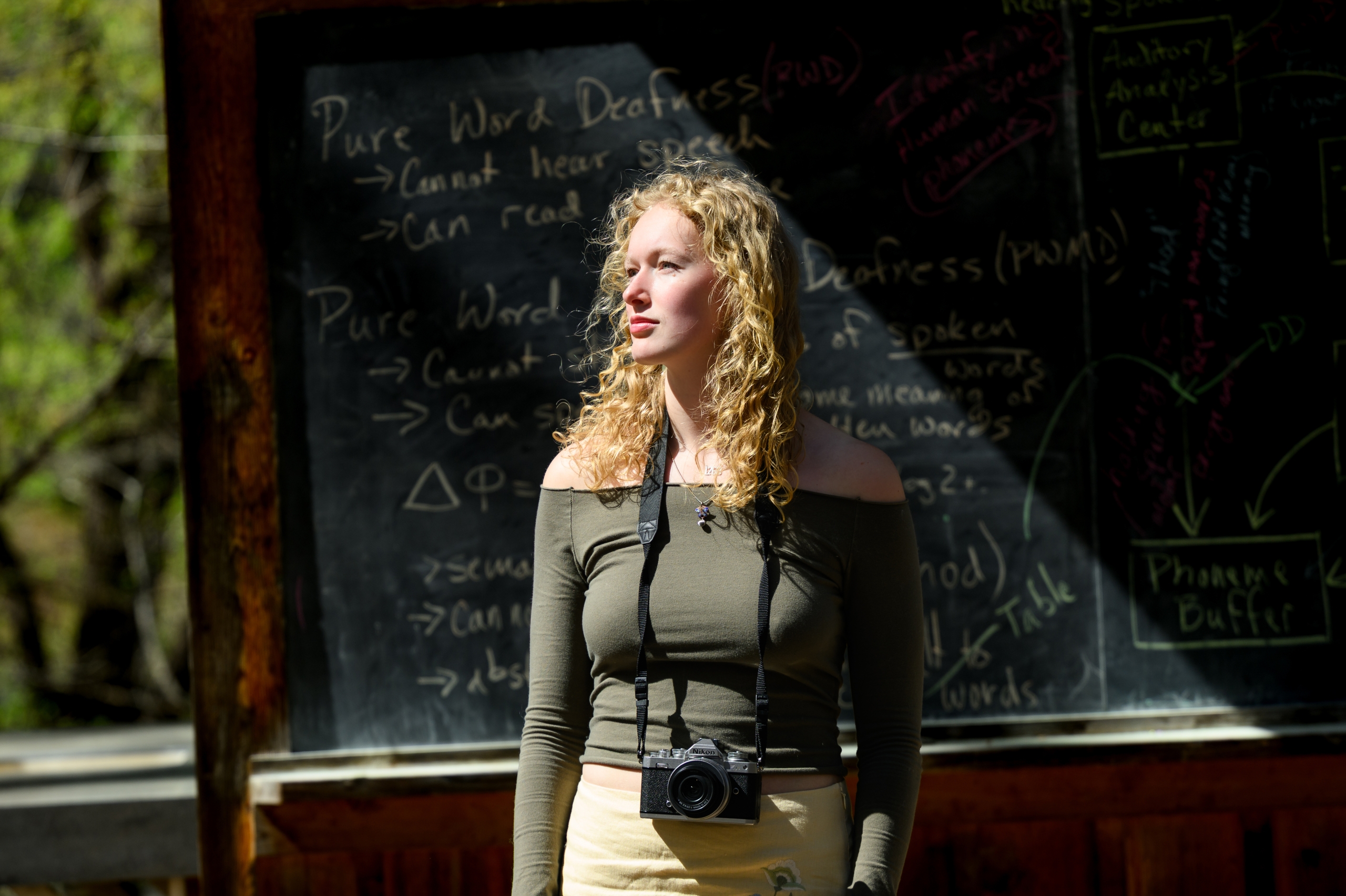
Poetry in Motion Aby Joyner ’28 believes in the power of photography and poetry, publishing two books, with another in progress.
Opening the Notes app on her iPhone, Aby Joyner ’28 typed D-R-I-P. Having just finished Erin Crosby Eckstine’s “Junie,” Joyner transferred all of her circled words from Eckstine’s book, like “drip,” “tangles” and “ember,” to a list that unfurled thoughts in her brain.
“It made me think of many things I could write about,” she said. “The way the rain dripped on the lake — how it sounded and how calming it was – when I was hiking and watched the creek. The way water drips from the eyes of myself and those I love. The way water drips, too, from the body as we move and how we run and exercise just to feel that. The way some of the most intriguing processes of life – crying, rain, natural movement, human movement – come in the form of a drip.”
Whenever the inevitable writer’s block descends, Joyner uses that list of fascinating words to serve as inspiration for her next poem.
“I just have all these words, and if I can’t think, I just choose a word,” she said. “I’m just like, ‘You just have to write about this word.’”
Since middle school, Joyner leaned on poetry – a passion amplified with the outbreak of COVID-19. Through writing, she unearthed an outlet to process her thoughts and emotions, and she founded a poetry club at her high school, The Governor’s Academy in Newbury, Massachusetts, when she felt her English classes didn’t devote as much time as she wanted to the genre. Then, in her junior year, she enrolled in a photography class, which kickstarted a second period in her artistic journey.
“I noticed that for some of the photos I took, I wanted to write poems about them, and then the other way around, too,” said Joyner. “It became this combined art for me. My friends that year for my birthday got me a book that was a book of poetry and photography, and I’d never seen something like that before.”
Using that as inspiration, Joyner created her own. In July of 2023, after her junior year of high school, she published her first book of poetry and photography, “Delicate Perspectives.”
Mann and Womanhood

In Joyner’s AP Photography class, a black-and-white image of two children standing on porch chairs appeared on the screen in front of her. One girl wore a tutu, blowing bubbles off the porch railing, while the other, with ringlets, stared directly at the camera. Barefoot and with remnants of summer fun sprinkled around them, these girls introduced Joyner to Lexington-based photographer Sally Mann. And by time her teacher switched to the next slide, Joyner’s perspective of photography and its capabilities had shifted.
Aby Joyner ’28 developed a love of portraiture photography and pairs her images with poems.“It just captured childhood and not caring about all these stressful things that everyone cares about,” she remembered.
By studying Mann’s work, Joyner zeroed in on portraiture.
“I think both photography and poetry are about capturing a moment or a person and their essence,” she said. “I had a mix of types of photos in my first book, but I really started falling in love with portraiture when I started getting better at photography my senior year.”
With the help of her photography teacher, David Oxton, she started experimenting with a medium format film camera in addition to her Nikon digital camera. And she found a muse specifically in women. With a camera in hand, Joyner turned strangers into friends by introducing herself to any woman who smiled back at her on the streets or in restaurants. After talking together for a while, she’d take a portrait and then later write a poem. Those creations resulted in her second book, “Womanhood Elucidated,” published in the summer of 2024.
“I really like taking pictures of people. Half of it is because I just really like capturing them. And half of it is because I love talking to random people and learning about their story – slowing down and talking to people that I wouldn’t have interacted with otherwise without photography,” Joyner said. “I learn about their story and then try to capture something. And then, with my poetry, I try to take my own experiences and their experiences and write a narrative for them.
“And I try to recognize the different boxes that society puts women in,” she added. “But the goal through the pictures and the poetry is to humanize them through their emotions and expressions in the photos. I feel like they both work together to create the message I’m trying to show.”
Believing in the Dream
During Joyner’s on-campus interview at Washington and Lee University, she was asked the typical question: “What would be your dream job?” Many other schools made the same inquiry, and at each institution, she answered the same way: She’d love to travel the world, making photography and poetry collections devoted to shining a light on situations that need change.
And at every other university, Joyner and the admissions person would laugh together about the unattainable nature of such a dream. But W&L was different.
“[Sarah Erickson, W&L’s associate director of admissions] was like, ‘We can make that happen for you if you come here’ and didn’t laugh,” Joyner said. “And I was like, ‘What are you saying? Why are you taking me seriously?’ Because I feel like art and writing in this world is just not taken very seriously. … That just meant a lot to me that she said that.”
Entering her first semester, Joyner enrolled in the Environmental Poetry Workshop class with Leah Naomi Green, visiting assistant professor of writing and environmental studies, and immediately felt her poetry was transformed.
“She changed the way I wrote,” Joyner said. “I felt like I improved so much just in that one class.
“Leah Green’s class just made me realize how passionate I was about it and how many different realms of poetry there are to focus on,” Joyner said. “I’d never been taught poetry; I’d read it, but I’d never been taught poetry.”
Joyner supplemented that experience the following semester with the Shenandoah Internship class with Beth Staples, assistant professor of English and editor of Shenandoah. That experience showed Joyner the mechanics of creating a literary magazine.
“I really enjoyed editing other people’s work and thinking about other people’s work, and how it could be better and how it’s good,” Joyner said. “I think sometimes when you’re editing your own work, it’s so hard to see everything clearly. But seeing other people’s work makes me see that clearly, and it also has helped me edit my own work.”
Joyner also started a poetry club on campus with Kenny George ’28; they meet every week and hold a workshop every other week. She earned a 2025 Kendrick Award through the Outing Club and will be crafting her third book this summer with the grant. Since Joyner lives in New England, a hotbed for renowned poets such as Emily Dickinson, Robert Frost and Ralph Waldo Emerson, she decided to use the Kendrick Award to travel to 10 different poets’ homes and camp nearby, all while taking photos and writing. For each poet, she will write one poem in their style about the nature of their hometowns, then she will write an additional poem about the photograph she takes there.
“It connects with where I’m from, too,” Joyner said. “I think there is a reason that poets come from there, and I want to discover that through nature.”
By the end of the summer, she hopes to have published her third book.
“I want to just make people feel things,” she said. “I feel like a lot of people are centered around distraction – or that we live in a very surveillance society now with social media. I think art is so important because it makes people really think and feel. A lot of people are just running from that all the time.
“So many people here have just given me so many opportunities that I would not have at a normal school,” Joyner added. “People are seeing my passion, and they’re giving me every shot that I could have. I just feel really grateful.”
Fast Questions With Aby Joyner
What is your favorite word?
“I think a really important word is ‘presence.’ I don’t necessarily use that word all the time in poetry. But if you aren’t present, you can’t do poetry. You can’t pay attention. You can’t notice all these little things. Poetry comes from paying attention.”
What is your favorite book?
“Twenty Love Poems and a Song of Despair,” by Pablo Neruda
What is your favorite spot on campus?
“I always walk on Woods Creek for 30 minutes by myself every day because it clears my head. And there’s this one rock that I just sit on, and I just listen to the water.”
 Aby Joyner ’28
Aby Joyner ’28 Aby Joyner ’28 developed a love of portraiture photography and pairs her images with poems.
Aby Joyner ’28 developed a love of portraiture photography and pairs her images with poems. Joyner opened with this photo in her second book, “Womanhood Elucidated.”
Joyner opened with this photo in her second book, “Womanhood Elucidated.” “I think art is so important because it makes people really think and feel,” said Joyner. “A lot of people are just running from that all the time.”
“I think art is so important because it makes people really think and feel,” said Joyner. “A lot of people are just running from that all the time.”
You must be logged in to post a comment.